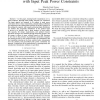Free Online Productivity Tools
i2Speak
i2Symbol
i2OCR
iTex2Img
iWeb2Print
iWeb2Shot
i2Type
iPdf2Split
iPdf2Merge
i2Bopomofo
i2Arabic
i2Style
i2Image
i2PDF
iLatex2Rtf
Sci2ools
ICC
2008
IEEE
2008
IEEE
On the Capacity of Training-Based Transmissions with Input Peak Power Constraints
— 1 In this paper, training-based transmissions over a priori unknown Rayleigh block fading channels are considered. The input signals are assumed to be subject to peak power constraints. Prior to data transmission, channel fading coefficients are estimated in the training phase with the aid of pilot symbols. In this setting, the capacity and capacity-achieving input distribution are studied. The magnitude distribution of the optimal input is shown to be discrete with a finite number of mass points. The capacity, bit energy requirements, and optimal resource allocation strategies are obtained through numerical analysis. The bit energy is shown to grow without bound as SNR decreases to zero due to the presence of peakedness constraints. Capacity and energy-per-bit are also analyzed under the assumptions that the transmitter interleaves the data symbols before transmission over the channel, and per-symbol peak power constraints are imposed. Comparisons of the performances of training...
Block Fading Channels | Communications | ICC 2008 | Peak Power Constraints | Priori Unknown Rayleigh |
| Added | 30 May 2010 |
| Updated | 30 May 2010 |
| Type | Conference |
| Year | 2008 |
| Where | ICC |
| Authors | Mustafa Cenk Gursoy |
Comments (0)

